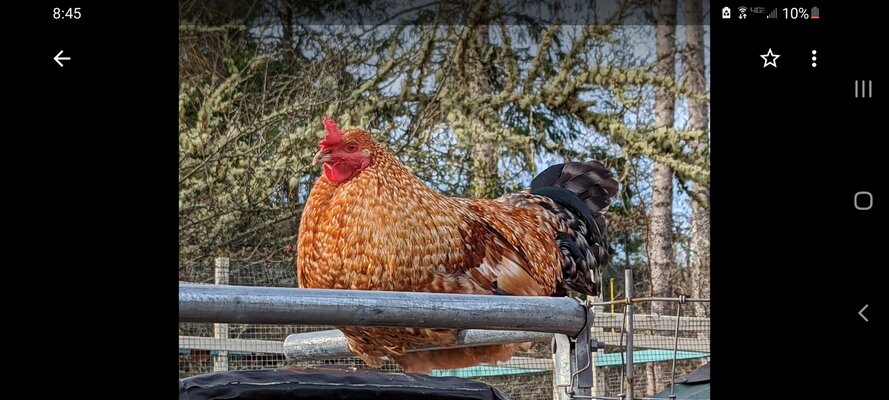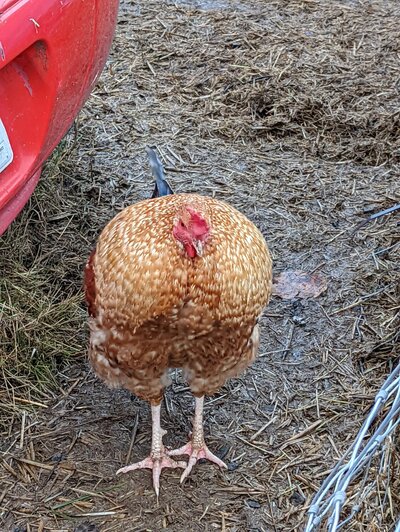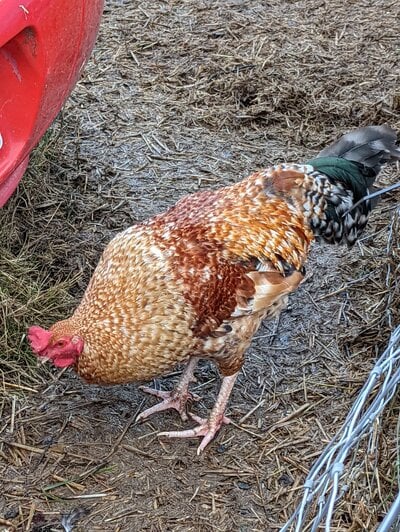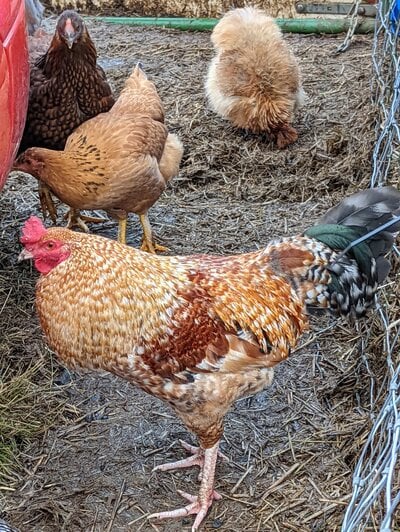Abigatorsaurus
Hatching
- Aug 1, 2021
- 1
- 2
- 5
So I plan to get more involved with my chickens in a few years, and would love to breed and potentially exhibit some of my favorite, less common chicken breeds. Namely Bielefelder Kennhuhn. While they are a dual-purpose breeds, I just absolutely adore their sweet personalities and how calm mine have always been!
One thing that really interests me would be structure a chicken breeding program differently than how I’ve seen hatcheries and at least backyard/hobby breeders. More specifically in regards to health testing.
While many good chicken breeders/hatcheries produce birds that are NPIP and vaccinated or treated against Fowl Pox, Marecks, and Coccidiosis, I haven’t come across anyplace that either does regular vet checks on or genetic testing on their parent stock. Again, I realize that these are chickens and they are not yet as widely beloved as say a dog or cat, therefore extra costs for testing and exams have been able to be looked over because hey, the chicken is still doing chicken things — it must be fine! But I would love to better the breed and create healthier birds for my own flocks — hence this post.
My goal with my farm would be to at least NPIP certified, and to vaccinate every bird against Marecks, Cocci, and Fowl Pox as appropriate. However, I cannot for the life of me find very many resources for genetic testing for birds/chickens. The closest I found was IQbirdtesting, and while they do mention chickens, it seems to be more for pet birds. However, since it’s the only one I found so far, I will add that to my list of potential health testing that I would ideally perform on my chickens. While not all of these diseases may not be as prominent or severe in chickens, it is what testing I found to be available. One $70 test package includes testing for Psittacosis (MOMP), Psittacine Beak and Feather Disease (PBFD), Avian Polyomavirus (APV), Avium Bordetella, Pacheco’s Disease, and Psittacine Proventricular Dilatation Disease (PDD), in addition to genetic sexing (jokes on them, Bieles are auto-sexing at hatch). Ideally I would test every bird before breeding (at least initially, and then once I have established that my birds are genetically clear of the disease/not carriers, I would likely switch to sporadically testing my existing birds in addition to testing all birds introduced to the breeding program) and those that aren’t fit to breed (either due to genetics or not fitting the SOP/wrong temperament) would be moved to my “retirement” coop or eventually sold/butchered.
I would also love to hire an Avian vet to come out for at least basic checkups on my parent stock, especially as they are a larger breed and I had my beloved 4 year old rooster die of a suspected heart attack. So I would love to hear if there are any genetic tests or noninvasive vet exams for birds that include screening for potential cardiac disease or illness/irregularity. I would also love to hear if anyone knows if there are any orthopedic or joint X-ray evaluations (similar to OFAs for dogs) that would make sense for chickens. Again, because they are a larger breed and putting on that weight can stress out their system — therefore I’d like to do some examinations on them, even if it is just a vet biannually feeling for abnormalities around the joints or evidence or scar tissue/injury on my breeding birds. Assuming the vet does just a basic examination (i.e. no vaccinations/wormings/etc) on each bird, I’d estimate an average fee of $15-40 in vet fees per animal, and probably around $60-100 in misc fees (travel/medical waste disposal/etc).
Again I know this would be a massive undertaking both financially and physically, but if I can increase the longevity of the birds I produce and better the chances of healthier birds, I want to.
I would appreciate any feedback or questions, as again, this whole project is still a ways out!

Photo of my beloved rooster, Buzz, at age 2, visiting a daycare to educate the kiddos on chickens! He loved all the petting, and was always such a wonderful example of what patience and training can accomplish with any animal.

Another photo of Buzz, age 1, enjoying a cuddle and belly rub session on my lap.

Holding Buzz (age 3.5) at my parents’ farm. I had to leave him there when I moved states, and it was his last summer before he passed in March. This was the last photo I have of holding him, when I went back for a doctors appointment (hence the cotton balls).

Buzz as a day old chick, after the shell membrane had dried out and he needed assistance getting out. Needless to say, this chicken was such an overwhelmingly positive influence in my life, and I would love to create more friendly, lovable, and functional birds like him. I do have a few of his descendants still at my parents’ farm, and maybe I’ll be able to keep some part of him alive in my flock when I do start this endeavor!
One thing that really interests me would be structure a chicken breeding program differently than how I’ve seen hatcheries and at least backyard/hobby breeders. More specifically in regards to health testing.
While many good chicken breeders/hatcheries produce birds that are NPIP and vaccinated or treated against Fowl Pox, Marecks, and Coccidiosis, I haven’t come across anyplace that either does regular vet checks on or genetic testing on their parent stock. Again, I realize that these are chickens and they are not yet as widely beloved as say a dog or cat, therefore extra costs for testing and exams have been able to be looked over because hey, the chicken is still doing chicken things — it must be fine! But I would love to better the breed and create healthier birds for my own flocks — hence this post.
My goal with my farm would be to at least NPIP certified, and to vaccinate every bird against Marecks, Cocci, and Fowl Pox as appropriate. However, I cannot for the life of me find very many resources for genetic testing for birds/chickens. The closest I found was IQbirdtesting, and while they do mention chickens, it seems to be more for pet birds. However, since it’s the only one I found so far, I will add that to my list of potential health testing that I would ideally perform on my chickens. While not all of these diseases may not be as prominent or severe in chickens, it is what testing I found to be available. One $70 test package includes testing for Psittacosis (MOMP), Psittacine Beak and Feather Disease (PBFD), Avian Polyomavirus (APV), Avium Bordetella, Pacheco’s Disease, and Psittacine Proventricular Dilatation Disease (PDD), in addition to genetic sexing (jokes on them, Bieles are auto-sexing at hatch). Ideally I would test every bird before breeding (at least initially, and then once I have established that my birds are genetically clear of the disease/not carriers, I would likely switch to sporadically testing my existing birds in addition to testing all birds introduced to the breeding program) and those that aren’t fit to breed (either due to genetics or not fitting the SOP/wrong temperament) would be moved to my “retirement” coop or eventually sold/butchered.
I would also love to hire an Avian vet to come out for at least basic checkups on my parent stock, especially as they are a larger breed and I had my beloved 4 year old rooster die of a suspected heart attack. So I would love to hear if there are any genetic tests or noninvasive vet exams for birds that include screening for potential cardiac disease or illness/irregularity. I would also love to hear if anyone knows if there are any orthopedic or joint X-ray evaluations (similar to OFAs for dogs) that would make sense for chickens. Again, because they are a larger breed and putting on that weight can stress out their system — therefore I’d like to do some examinations on them, even if it is just a vet biannually feeling for abnormalities around the joints or evidence or scar tissue/injury on my breeding birds. Assuming the vet does just a basic examination (i.e. no vaccinations/wormings/etc) on each bird, I’d estimate an average fee of $15-40 in vet fees per animal, and probably around $60-100 in misc fees (travel/medical waste disposal/etc).
Again I know this would be a massive undertaking both financially and physically, but if I can increase the longevity of the birds I produce and better the chances of healthier birds, I want to.
I would appreciate any feedback or questions, as again, this whole project is still a ways out!
Photo of my beloved rooster, Buzz, at age 2, visiting a daycare to educate the kiddos on chickens! He loved all the petting, and was always such a wonderful example of what patience and training can accomplish with any animal.
Another photo of Buzz, age 1, enjoying a cuddle and belly rub session on my lap.
Holding Buzz (age 3.5) at my parents’ farm. I had to leave him there when I moved states, and it was his last summer before he passed in March. This was the last photo I have of holding him, when I went back for a doctors appointment (hence the cotton balls).
Buzz as a day old chick, after the shell membrane had dried out and he needed assistance getting out. Needless to say, this chicken was such an overwhelmingly positive influence in my life, and I would love to create more friendly, lovable, and functional birds like him. I do have a few of his descendants still at my parents’ farm, and maybe I’ll be able to keep some part of him alive in my flock when I do start this endeavor!
Last edited:








